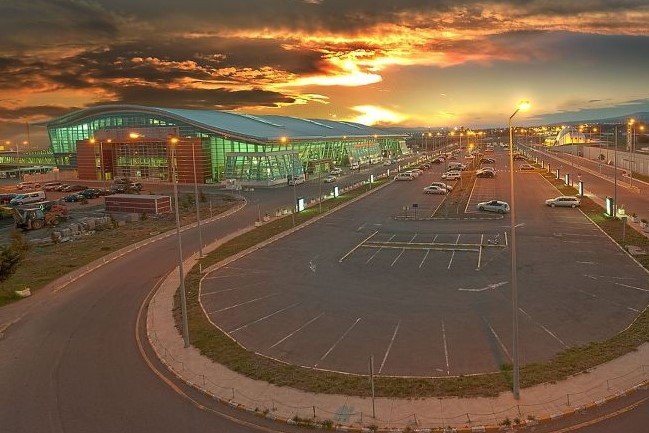Doctor Giorgi Akhobadze, a well-known critic of the Georgian government, says he was violently attacked near Tbilisi International Airport by men claiming to be police officers — an incident that’s now sparking outrage across the country.
Outspoken Doctor Says He Was Followed and Beaten
In a social media video posted late Sunday night, Dr. Giorgi Akhobadze said a black Toyota Prado trailed his taxi from the airport before pulling him over and attacking him. His words were blunt and emotional, carrying the rawness of someone who didn’t expect to live through the night.
“They said they were police,” Akhobadze recounted, visibly shaken. “They pulled the door open, dragged me out, and started hitting me. They called it an ‘event.’ I call it an assault.”
The doctor, a cardiologist who’s become a familiar voice in civil protests and televised debates, suggested the attackers were linked to Lasha Baslandze, a figure reportedly close to government officials. “They’re terrorists,” he said flatly. “No one will investigate this. Everyone knows how this goes.”

A Pattern That’s Hard to Ignore
To many Georgians, the story sounds uncomfortably familiar. Over the past year, several journalists, activists, and lawyers have claimed they were assaulted or intimidated after criticizing authorities.
Rights organizations say the problem is growing. Transparency International Georgia recently reported a “consistent pattern of harassment” against outspoken citizens. The group cited at least 15 reported assaults on activists in the last 12 months — nearly double from the previous year.
And what’s more troubling? Almost none of these cases resulted in prosecution.
A broader concern shared by rights monitors
Human Rights Watch and Amnesty International have both warned that the environment for free expression in Georgia is deteriorating.
“The number of politically motivated attacks has gone up, and impunity remains a defining feature,” one regional researcher told Bloomberg on condition of anonymity, fearing backlash.
One opposition MP described the latest incident as “a test for Georgia’s soul.” He added, “If a doctor can be beaten in daylight by people claiming to be police, then who’s safe anymore?”
Airport Authorities Remain Silent
Tbilisi International Airport officials did not immediately respond to media inquiries. Witness accounts remain scarce, and so far, there’s no CCTV footage publicly released.
A local taxi driver who said he witnessed part of the scene told independent outlet Mtavari TV that the black SUV “came out of nowhere” and blocked the road. “They looked like security guys, big build, dark clothes. One of them flashed a badge, but it was too quick to read.”
The driver, who asked to remain anonymous, said he was “too scared to intervene.”
One sentence can say it all: fear is contagious.
Police and Government Yet to Comment
Georgia’s Ministry of Internal Affairs has not issued a formal statement. Calls to the press office on Monday morning went unanswered.
By midday, opposition politicians were demanding clarity. Elene Khoshtaria, a well-known opposition leader, called for an independent investigation, saying, “We are turning into a place where police identity is used as a weapon to silence citizens.”
Meanwhile, pro-government commentators on social media questioned the credibility of Akhobadze’s claims, suggesting he might be exaggerating or staging the event for political gain — an accusation his supporters find deeply insulting.
A Familiar Chill in Georgia’s Public Life
Over the past decade, Georgia has been lauded as a democratic success story in the Caucasus. But lately, the tone has shifted. Civil society groups say intimidation and disinformation have crept back into everyday life, creating what one activist described as “a fog of fear.”
The attacks aren’t just physical. Doctors, teachers, and artists who speak up online often face trolling campaigns, workplace pressure, and police “visits” that never make it into official reports.
Below is a small overview based on available NGO data over the past three years:
| Year | Reported Attacks on Civic Activists | Investigations Opened | Convictions |
|---|---|---|---|
| 2023 | 7 | 2 | 0 |
| 2024 | 9 | 3 | 1 |
| 2025 | 15 (so far) | 1 | 0 |
It’s a pattern that’s hard to read without wincing.
Social Media Reacts with Fury
Within hours of Akhobadze’s video, social media erupted. Hashtags like #StandWithGiorgi and #GeorgiaNeedsJustice trended across local platforms.
One user wrote, “If the police can beat a doctor, imagine what happens to the rest of us.” Another said, “This country is slipping into darkness again.”
Even some government sympathizers expressed discomfort, calling for transparency and calm. “Whatever the politics, violence cannot be the answer,” wrote one ruling-party supporter.
But others saw a chilling echo of past eras — a return to the kind of unchecked policing Georgians thought they’d left behind.
“This Isn’t Just About Me,” Says Akhobadze
In a short follow-up message, Dr. Akhobadze thanked supporters but insisted the story was bigger than his personal ordeal. “This is about fear and silence,” he said. “If I stay quiet, it means they win. And if they can do this to me, tomorrow it’ll be you.”
His words struck a nerve. Civil society groups are now pushing for international observers to monitor any investigation, citing Georgia’s recent slide in global democracy indexes.
Basically, the doctor’s case has become a mirror — showing not just bruises on one man, but on an entire democracy trying to keep its balance.
